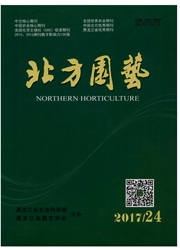

 中文摘要:
中文摘要:
以沙冬青种子为试材,采用恒温培养法研究了不同浓度NaCl(10、20、30、40、50、60、70、80、90、100mmol/L)对沙冬青种子萌发及幼苗生长的影响,并观察了萌发恢复率。结果表明:在NaCl模拟盐胁迫下,沙冬青种子萌发率与NaCl浓度呈极显著负相关(R2=0.9602),NaCl浓度低于30mmol/L时,对沙冬青种子的萌发影响较小,其中10mmol/L NaCl能提高沙冬青种子萌发率,而高于80mmol/L浓度的NaCl对种子萌发、幼苗鲜重和胚根生长均产生抑制作用。沙冬青幼苗根长、地上部分鲜重、根鲜重以及根冠比随NaCl浓度的增加呈下降趋势;可溶性糖含量、脯氨酸含量、保护性酶(POD、SOD)活性随NaCl浓度的增加表现为先增加后降低趋势;种子浸提液丙二醛(MDA)含量和CAT活性随NaCl浓度的增加逐渐上升;幼苗根系活力(TTC)与NaCl溶液浓度呈单峰曲线,在30mmol/L出现峰值。解除胁迫条件,不同NaCl处理沙冬青种子复水萌发率平均达15.8%,复200mg/L赤霉素萌发率平均达23.1%。综合来看,沙冬青种子恢复萌发率与NaCl浓度之间呈极显著负相关,表明一定浓度盐胁迫下沙冬青种子仍具有较高的萌发潜力和抗盐特性,但过高浓度的NaCl导致沙冬青种子失活。
 英文摘要:
英文摘要:
Taking seeds of Ammopiptanthus mongolicus as material,seed germination and seedling growth of Ammopiptanthus mongolicus were measured under treatment of ten different NaCl concentrations from 10to100mmol/L with incubation method,and the restoration germination of seeds was observed.The results showed that the seed germination percentage of Ammopiptanthus mongolicus showed a significant negative correlation(R^2=0.9602)with NaCl stress,seed germination percentage of Ammopiptanthus mongolicus were improved by low content NaCl(10mmol/L)stress and treated with NaCl concentration at〈30mmol/L was not significantly comparing with control,however the germination of those seeds treated with NaCl at higher concentration(≥80mmol/L)was inhibited.The seedling root length,the fresh weight of shoots and roots of seedlings,and the R/T rate of seedlings gradually decreased with the increasing of the concentration of NaCl,activity of POD and SOD,soluble sugar,proline tended towards increase to decrease,activity of CAT and MDA content tended to go up gradually,and TTC showed a single-peak curve.When removing these tress of NaCl,some non-germinable Ammopiptanthus mongolicus seeds germinated after complexed distilled water and 200mg/L Gibberellin and recovery germination percentage reached 15.8%and 23.1%.Comprehensive comparison,Ammopiptanthus mongolicus seed germination recovery germination was significantly negative correlation with salt concentration.It also showed that Ammopiptanthus mongolicus seeds displayed a higher potential germination and salt resistance properties in a range of NaCl concentrations and were inactivated in higher concentrations.
 同期刊论文项目
同期刊论文项目
 同项目期刊论文
同项目期刊论文
 期刊信息
期刊信息
